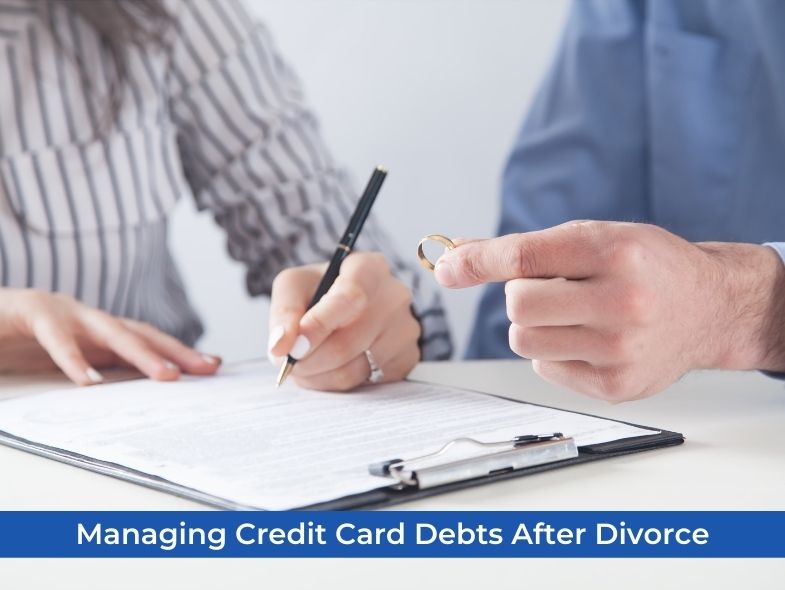With the increasing divorce rate in Canada, taking care of your credit card debts after divorce is crucial. Careful planning and proactive measures are needed to navigate the financial challenge of divorce and regain control over your finances.
This credit repair blog will guide you through managing your credit card debts after divorce.
Dos and Don’ts to Manage your Credit Card Debts after Divorce
Do’s when managing Credit Card debts after Divorce:
• Do assess your Financial Situation
Understand the amount you owe, interest rates, and minimum payments for each debt. You must know these factors to know when to start organizing and managing credit card debts.
• Do Create a Budget
Create a realistic budget that reflects your post-divorce income and expenses. Prioritize debt payments and allocate funds accordingly.
• Do Communicate With Your Ex-Spouse
If you have joint debts, it is essential to maintain open communication with your ex-spouse to avoid future conflicts. Discuss and agree upon responsibilities for debt repayment.
• Do close Joint Accounts
Open individual accounts in your name to establish financial independence. It is also important to close existing joint credit card accounts to prevent further debt accumulation.
• Do Prioritize Debt Payments
Learn what debt you should prioritize. Get rid of debts that have higher interest rates or larger balances first. Make at least the minimum payments on other debts to avoid penalties and late fees.
• Do Explore Debt Consolidation
Consolidating your credit card debts into one single debt can make payments bearable. There may be pros and cons, so it is important to explore them first before deciding if it would be best for your current situation.
• Do Seek Professional Advice
If you are struggling with managing your credit card debts, seeking advice from a financial advisor is okay. They’ll give you an honest and unbiased opinion to develop a realistic financial plan. especially when you need credit repair help.
Don’ts when Managing Credit Card Debts after Divorce:
• Don’t Ignore Your Debts
Ignoring your debts can take a toll on your finances in the future and can lead to financial stress. Face your debts head-on and take the necessary steps to manage them effectively.
• Don’t make Impulsive Financial Decisions
Divorce can take a toll on your financial situation. That is why taking time to decide is necessary to avoid further problems with your finances. Evaluate your financial situation thoroughly, then make the decision. Making impulsive decisions about spending or taking on new debts can give you more trouble in the future.
• Don’t Solely Rely on Credit Cards
While credit cards may provide short-term relief, relying heavily on them can lead to a cycle of debt. Use credit cards responsibly and explore alternative methods of managing your finances.
• Don’t Overlook Legal Agreement
Ensure to adhere to any legal agreement related to debt division outlined in your divorce settlement. Failing to comply with these agreements could have legal consequences.
• Don’t Drain Retirement Accounts
Not only will you have a hard time when you retire, but there are penalties you have to pay when you decide to withdraw retirement savings early.
• Don’t Hide Financial Information
Be transparent about your financial situation. Hiding or manipulating financial information can complicate and strain relationships, especially during divorce proceedings.
• Don’t Neglect Your Credit Score
Make timely payments and avoid defaulting on your debts. Maintaining a good credit score is essential for future financial Opportunities and obtaining favourable interest rates.
Evaluating Divorce-Related Financial Obligation
• Reviewing Divorce Settlement Agreement
Review the terms of your divorce settlement agreement to understand your financial obligations. This agreement often covers the split of assets, liabilities, and any ongoing debts, like child support or spousal support. Your debt management strategy will be more effective if you know these commitments.
• Identifying Joint Debts
Make a list of what you have accumulated during your marriage. These include mortgages, car loans, and credit card debts. Joint debts are those for which you and your ex-spouse are equally responsible. Identifying these debts will allow you to plan how to handle them effectively.
• Distinguishing Individual Debts
Separate individuals from joint debts. Individual debts are debts that are under your name only. It is essential to distinguish these debts from joint debts to ensure that you solely assume responsibility for your individual obligations.
• Evaluating Debt Repayment Capacity
Assess your ability to repay debts based on income, expenses, and other financial commitments.
Consider factors such as changes in income due to divorce, potential child support or alimony payments, and your overall financial stability. Understanding your repayment capacity will help you determine how to allocate your resources effectively.
• Prioritizing Debts
Prioritize your debts based on factors including interest rates, repayment schedules, and the legal responsibilities specified in your divorce settlement. Sort them according to priority, with the highest priorities needing immediate attention and the lowest priorities being taken care of as resources permit.
• Considering Debt Allocation
If joint debts are assigned to you and your ex-spouse based on your divorce settlement, determine how to divide the repayment responsibilities. It’s important to clarify who is responsible for which debts to avoid confusion and potential credit damage.
• Seeking Legal Advice
Consider seeing a divorce lawyer or a financial expert who specializes in divorce problems if you run into difficulties or complications when assessing your financial obligations relating to the divorce. They can offer advice on responsibilities under the law, how to divide debt and potential strategies for debt management.
Conclusion:
Managing debts after a divorce require careful evaluation, proactive communication, and strategic planning.
By assessing your financial obligations, prioritizing debts, and seeking professional guidance, you can regain control of your finances and pave the way toward a more secure financial future.
Remember to stay disciplined, make timely payments, and focus on rebuilding your credit. With determination and perseverance, you can successfully navigate the challenges of post-divorce debt management and achieve financial stability.
Additionally, there are many good credit repair companies if you need help with your credit.




